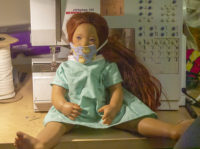Earlier this month, the Lincoln Squirrel asked readers to share their thoughts on what’s changed for them since the Covid-19 lockdown began. Here are some of their responses.
From Ellen Morgan:
My granddaughter, Dorothy Grubler, lives in Hudson, N.Y. She is four and a half and worried — all her dolls are sick and in bed, and she is short on hospital beds. So I made them all masks and gowns. I sent them to her since I can’t visit.
From Sharon Antia:
I’ve been surprised at how quickly the titles I have on hold through Minuteman Library Network have become available, and then I made the connection. Everyone must be home catching up on their reading so we are all cycling through our reading lists quicker.
I miss my grandchildren.
My house gets dirty a lot quicker when I’m home all day.
I love being home.
It’s hard not to just run into Donelan’s for this or that. I’m not good at planning a week or two’s menu and shopping all at once, and though I happily live off rice and beans, I prefer to have fresh fruits and vegetables to go along with them.
I do not watch the news — well, except I try to catch Governor Cuomo — and I watch “The Tonight Show” the next day on Hulu (OK, this is not the news but it is as close I currently allow myself to news). Other than that I read the Globe and the Times. Watching the news leaves me with a feeling of hopelessness. I miss listening to public radio but refrain for the same reason as above.
Making and distributing masks to family, friends, and neighbors gives me the opportunity to feel like I’m at least doing something to help.
I’ve been taking advantage of yoga classes online, live music, Zoom, and talking to my siblings more than usual.
I subscribed to “In Ayr’s Kitchen” on YouTube. Our neighbor, Ayer Muir, owner of the Clover restaurants, has an almost daily show telling us how to use our pantry items. I either watch him live or the next day. Have made many of his recipes, all with much success.
Tucker Smith has been creating a “Good News” wall in her house along with a bingo card to remind herself and others to look for the good things happening around us in this uncertain time.
[Best_Wordpress_Gallery id=”133″ gal_title=”Covid-Tucker”]
From Jennifer Glass:
Something I’ve really enjoyed is spending time on Lincoln’s trails. We walked from our house to Walden Pond last weekend — something we never took the time to do before now. In addition, it’s been great to get to some of the organizational projects that always fall to the bottom of the to-do list. I also think the garden/yard will get much more attention this year.
Frozen fruit and flour have been harder to find at Donelan’s. We are grateful that Codman has really risen to the occasion and we will continue to be frequent shoppers there even when the restrictions lift.
This is definitely a challenging time for college students who miss being on campus. The work continues to be rigorous, but the experience is not the same. On the other hand, there’s been lots of positive sister time.
I work part-time at the Grasshopper Shop in Concord. I miss being there, interacting with customers and ordering crazy socks. And while it’s convenient to have town-related meetings from home, I do miss the in-person interaction.
Joanna Schmergel took these photos during long walks around Lincoln.
[Best_Wordpress_Gallery id=”134″ gal_title=”Covid-Joanna”]
“Life has changed in tremendous ways,” said David Levington, an independent-living resident at The Commons in Lincoln. No one can have visitors. Staff members take requests and leave meals and groceries outside residents’ doors, and his daughter drops off items for him outside his porch. He ventures out only to walk his dog and drop off bags of trash.
The only thing that compares to the Covid-19 pandemic, Levington said, is the Blizzard of ’78, which happened when he was the superintendent at Lincoln-Sudbury Regional High School. The storm caught the region mostly unprepared, killing dozens, stranding hundreds inside their cars on roads and highways, and paralyzing the Northeast for a week.
“The whole town was shut down, but there was an old civil defense hospital area in the school basement back from the Sputnik days,” Levington recalled. “There were lots of cots; they were thinking of making L-S a refuge, but in the end they didn’t.”
One of his biggest challenges in the immediate aftermath of the blizzard emergency was making sure the off-campus students were safe and could get home. L-S in those days encouraged internships, “alternate semesters,” and other study-away opportunities. “We had a student studying in Montreal who couldn’t get home, one kid interning with the mayor in Philadelphia, and one in a yurt in Colorado,” he said. “The French Club was in Montreal — the teacher had maxed out her credit card and didn’t know what to do.”
As illnesses and deaths mount and restrictions on people’s lives continue for months, the pandemic’s effects will be felt for far longer than a natural disaster. “A blizzard is discrete — it has a beginning and an end,” Levington noted. “This is really not comparable.”

Leave a Reply